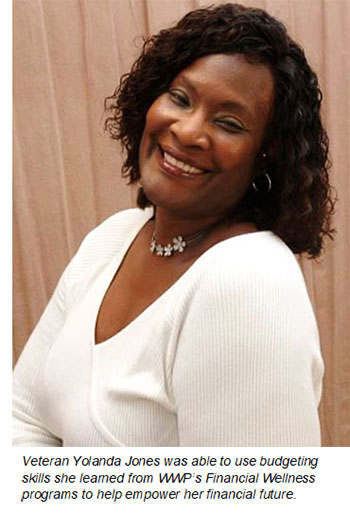Wounded Warrior Project Helps Veterans Boost Their Financial Well-Being

Yolanda Jones was depressed. Her neck hurt. Her legs ached. She was sleeping on friends’ couches, embarrassed to tell them she had no place to live, and too independent to ask for help.
It hadn’t always been like this for Yolanda. She served in the military for almost two decades, primarily working in the medical field. But her time in the service, including a stint in Iraq, left her with injuries — both physical and mental. After she was medically retired in 2005, she underwent neck surgery, and faced an uphill battle to regain her physical — and financial — independence.
“It was very hard to take a step without tumbling,” Yolanda said of her post-surgery recovery. “I can wholeheartedly relate to babies trying to learn how to walk. I have all the sympathy in the world for them because I would fall and had to start over.”
She also struggled to pay her bills. Unable to work, she depleted her savings, and on top of that, she took out an adjustable-rate mortgage to buy her house in Georgia. In 2005, after her mortgage payments ballooned, she went into foreclosure. She found jobs in IT and retail, and while she was working hard, she wasn’t dealing with her post-traumatic stress disorder. She became anxious and irritated at work and was putting even more strain on her already-aching knees and neck.
A friend in Illinois connected her to a student learning academy, which was hiring for several positions and thought Yolanda’s computer background would be a good fit. Yolanda accepted the job and became a supervisor in the academy’s IT department. She also began teaching computer courses at the local community college. Finally, she found her fit, but, in 2015, she aggravated a leg injury she sustained in the military and required knee surgery. She ended up losing her job and used up her savings to survive while she waited for workers’ compensation to be approved.
During that time, Yolanda was able to get her VA disability increased from 30% to 50% and, while that helped, it paled in comparison to what she had been making at her IT job. Even as her disability increased to 70%, it didn’t cover all her expenses. She had a large car payment, but knew she needed a vehicle to look for work and attend VA appointments.
Find out how you can become more financially resilient through our Warriors to Work, Benefits Services, and Financial Education programs.
Yolanda returned home to Georgia and looked into social security or a vocational school to get another marketable skill that wouldn’t be so physically demanding. She applied for assistance, struggling to keep her head above water and at least keep her car. But for almost two years, she found herself homeless. She slept on different friends’ sofas, not letting them in on the full extent of her struggles.
“I didn’t want to be a burden in any way,” Yolanda said. “That’s the military mentality. We don’t want anybody to feel sorry for us.”
Even after increasing her VA disability rating to 100%, Yolanda found her financial life in ruins. She still had a long list of unpaid bills, a big car payment, and less income than when she had been working in Illinois. But Yolanda’s fighting spirit wouldn’t let her give up. For Yolanda, bankruptcy was the right answer; a chance to start over, a fresh financial beginning.
“I decided I’m going to do it because I can’t live this way,” Yolanda said. “This is too traumatic for me and it’s very overwhelming and I still have a child to take care of. … I was just starting to come to grips with the fact that I had PTSD, so I was already overwhelmed.”
Finding a Way Forward

Yolanda fulfilled her bankruptcy obligation, and knew it was important to not get in that situation again. A registered warrior with Wounded Warrior Project® (WWP), Yolanda learned about the nonprofit’s Financial Education programs, including seminars where warriors and family support members are offered free one-on-one sessions with financial experts.
“In those sessions, they can really talk about things that they're maybe struggling with, or talk about their plan,” said WWP Financial Education Manager Deborah Olvera. “They can discuss some options and suggestions to help them enhance that plan or to stay on track.”
In addition to the sessions, WWP’s financial education specialists help connect warriors to programs and services that empower them to create and maintain their own budget.
“We assess each warrior to find out where they are in their financial journey, where they would like to be, and what their long-term goal is,” Deborah said. “Then we help them set short-term goals, to get them on track, and to eventually realize that long-term goal.”
For Yolanda, learning how to develop a budget strategy changed her approach to spending. She started with writing down her big expenses but also began including her smaller expenses like fast food or craft supplies. She realized how quickly those “little” things added up so she modified her spending.
“Budget is very important, because we tend to spend and think there’s money in the account, or that we have this much left over,” Yolanda said. “But if you budget, you know exactly how much you have left at the end of the month or for the month.”
Veterans and Financial Health
The financial concerns of wounded veterans vary based on their special circumstances, Deborah said. Some veterans are learning to live on a fixed monthly income based on VA disability or pension payments. Some are trying to find work in a civilian workforce that is significantly different from military life. And some may have joined the military right after high school and never learned how to budget for everyday necessities like rent, electricity, and groceries.
“We have a diverse group of warriors when it comes to their finances,” Deborah said. “We have some warriors who have never built a budget in their lives. And then we have warriors who are using our program to maintain the security they currently have. They can learn some more and make sure they're covering all their bases.
“The No. 1 thing I always focus on is, if you don't have a budget, build a budget,” Deborah added. “If you do have a budget, then you want to have that budget reviewed.”
The WWP Financial Education program helps warriors take more control of their financial health by creating a budget, or spending plan as Deborah calls it, unique to each warrior.
“We do have warriors who will set goals, they'll be chugging along, and then they face a setback,” Deborah said. “And we help them through that setback to get them back on track.”
A Bright Financial Future
Yolanda said learning about financial wellness and how to take control over her financial well-being has changed her life.
“I don't have to look out my window every day to make sure my car is there; I know it's there,” she said. “I automatically know what's coming out of my account every month, and I know how much is left. I’ve got a lot more decisions I can make, and I have a lot more leverage and a lot more knowledge regarding my credit and how to use it.”
And the financial education provided by WWP can transcend the warrior’s experience and impact the financial decisions of future generations.
“The finance classes definitely have helped me exponentially because sometimes you don't learn a lot about money [growing up]. You just kind of wing it and hope you're doing the right thing,” Yolanda said. “So everything I've learned, I taught my sons.”
Contact: — Paris Moulden, Public Relations, pmoulden@woundedwarriorproject.org, 904.570.7910
About Wounded Warrior Project
Since 2003, Wounded Warrior Project® (WWP) has been meeting the growing needs of warriors, their families, and caregivers — helping them achieve their highest ambition. Learn more.